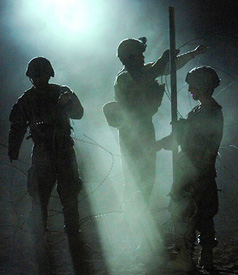Did you know that Truthout is a nonprofit and independently funded by readers like you? If you value what we do, please support our work with a donation.
WikiLeaks has released more than 90,000 classified US reports and documents spanning 2004-2009 detailing Paksitan’s collusion with Afghan militants and the Taliban’s increasing sophistication. The White House condemned the leak.
The White House condemned the leak of a vast cache of on-the-ground reports from US military and intelligence personnel on the war in Afghanistan, saying the leak is “irresponsible” and harms national security.
The revelation of more than 90,000 classified reports and documents spanning 2004-2009 is likely the largest leak in the history of the US military or intelligence community. The secret reports were obtained by WikiLeaks and given to The New York Times, London newspaper The Gaurdian, and German magazine Der Spiegel, all of which published reports on the documents Sunday. Wikileaks subsequently posted the documents on its website (click to view).
The documents provide a blow-by-blow view of the war and reveal, among other things, that the Taliban has used portable, heat-seeking, ground-to-air missiles to bring down US helicopters, which the military had not previously revealed; that US military and intelligence personnel widely suspect that Pakistan’s intelligence agency is cooperating with Afghan militants to plan attacks; and that a secret contingent of US special forces operates outside the coalition command structure in Afghanistan with the goal of killing or capturing top Taliban and Al Qaeda leaders.
The White House blasted the leak.
“The United States strongly condemns the disclosure of classified information by individuals and organizations which could put the lives of Americans and our partners at risk, and threaten our national security,” National Security Adviser Gen. James Jones said in a statement. “Wikileaks made no effort to contact us about these documents – the United States government learned from news organizations that these documents would be posted.”
General Jones tried to blunt some of the revelations by pointing out that while the leaked documents cover the entire span of the war, President Obama announced a new strategy in December 2009 “precisely because of the grave situation that had developed over several years.”
The New York Times reports that WikiLeaks, an organization that says its goal is to promote transparency in governments by leaking secret information that reveals unethical behavior, did not release 15,000 of the documents until it could redact names of people who might be harmed were their identities revealed. The Guardian reports that “most of the material, though classified ‘secret’ at the time, is no longer militarily sensitive.”
Do you like this? Click here to get Truthout stories sent to your inbox every day – free.
For example, one of the revelations of the cache is the existence of Task Force 373, a group of special forces US soldiers who report directly to the Pentagon, rather than the coalition command structure on the ground in Afghanistan, and are tasked with killing top Taliban and terrorist leaders, reports Der Spiegel. But the existence of such a force had been previously suspected and reported on.
“For years, a major effort was made to keep a lid on the details of their deployment,” reports the German paper. “With the leaking of the war logs on Sunday, however, their work is an open secret.”
Similarly, the New York Times reports that a major revelation of the documents is that those who wrote them said Pakistan allowed its intelligence agents to meet secretly with Taliban members and help plot strategy in Afghanistan. This has been long suspected by the US.
The Washington Post reports that the new tack taken by Wikileaks – in giving newspapers access to documents before publishing them itself – represents the “growing strength and sophistication” of the organization. Wikileaks founder Julian Assange will not reveal the source for the cache of documents.
In May, US military intelligence analyst Bradley Manning was arrested for allegedly leaking to WikiLeaks a video of a US military helicopter attack in Iraq that killed civilians. In June, The New Yorker profiled the founder of Wikileaks, an Australian man named Julian Paul Assange. The magazine said that Mr. Assange would soon need to confront “a deeper question that WikiLeaks must address: What is it about?
The Web site’s strengths—its near-total imperviousness to lawsuits and government harassment—make it an instrument for good in societies where the laws are unjust. But, unlike authoritarian regimes, democratic governments hold secrets largely because citizens agree that they should, in order to protect legitimate policy. In liberal societies, the site’s strengths are its weaknesses. Lawsuits, if they are fair, are a form of deterrence against abuse. Soon enough, Assange must confront the paradox of his creation: the thing that he seems to detest most—power without accountability—is encoded in the site’s DNA, and will only become more pronounced as WikiLeaks evolves into a real institution.
Press freedom is under attack
As Trump cracks down on political speech, independent media is increasingly necessary.
Truthout produces reporting you won’t see in the mainstream: journalism from the frontlines of global conflict, interviews with grassroots movement leaders, high-quality legal analysis and more.
Our work is possible thanks to reader support. Help Truthout catalyze change and social justice — make a tax-deductible monthly or one-time donation today.
